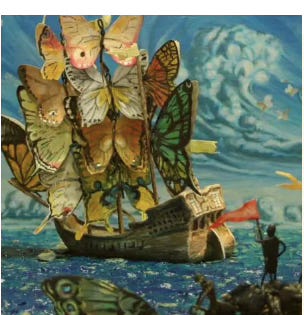We at The Writing Laboratory love hybrid writing. Why? Because it is whatever it wants to be. It is something and nothing at all. It defies the rules. Hybrid might be a prose poem, or a piece of creative nonfiction with a poem placed at its centre. It might be a lyric essay. It might be auto fiction, or a memoir that plays with our concept of truth to the point that the reader asks – is this really nonfiction or has it ventured too far into the speculative world? Hybrid is non-binary, it slips between the gaps, it defies categories.
As author Tania Hershman tells us, ‘it hops across genre boundaries… it can be a collision of existing genres, or is can be its own thing entirely.’ Tania is author of a hybrid work, and what if we were all allowed to disappear. She is also a teacher and we are very lucky to have her over at London Lit Lab. She teaches some of our most popular courses.
Hybrid writing does not want to be boxed or packaged!
So if you like this idea of shaking off that restrictive coat of whatever genre or form you’ve been writing in, whether it be fantasy, female fiction, short stories, nonfiction, and you want to write for writings sake and be playful, take risks, you might really like a course that London Lit Lab is running with Tania Hershman, Let’s Get Hybrid! Live on Zoom. Tanis will be teaching this course over six weeks, with four Zoom sessions, reading material and detailed feedback from Tania herself. It runs from 19th Feb and costs £205.
Here Tania will leave us with her favourite hybrid literature: ‘Bluets by Maggie Nelson, Citizen by Claudia Rankine, and The Most of It by Mary Ruefle, all of which are variously labelled ‘poetry’, ‘lyric essay’, ‘non-fiction’. For a few favourite individual pieces, DIAGRAM journal is a wonderful place to look — here are a few.’
If you’ve read something that might be defined at hybrid, let us know in the comments below. We’d love to hear from you
Interested in writing a lyric essay?
Tip
A lot of fun can be had from writing creative nonfiction, and putting an imaginary angle on the facts of your life. One lovely expression of this is the lyric essay (click here for some examples). This is the most poetic of the different essay structures, because it’s the most visceral – often led by an image or a feeling, an emotional tone rather than a literal fact or theme. As the name suggests, it’s more like a song than anything that represents an essay. It’s also the form where you can be most playful with your use of language.
Exercise
Here’s a prompt for writing a lyric essay. Start with a title like ‘brown’. And write a list of all the things you can think of from your life that resemble the colour brown. Now link those things together in a lyric essay by their association with the colour. Once you’ve done that, see how differently an essay might turn out if you follow a different colour like ‘yellow’.
Accountability Club
Don’t forget: We are offering a free trial for the first three sessions of our Accountability Club taking place on Mondays 7-9pm (UK Time, GMT/UTC) for the remainder of February (12th / 19th / 26th). After a 10min casual chat at the beginning, the rest of our session is dedicated to silent private writing on whatever we’re working on at the moment. These online weekly sessions get us writing regularly in scheduled sessions where we have made the decision to prioritize and commit to writing. They also help us stay focused and motivated through the encouragement and social accountability of co-writing with other writers. Join us for our first 2hr session on the 12th of February via our Zoom link for all three sessions: https://us06web.zoom.us/j/88479915243 . If you have any questions, please get in touch with Ennis at ennis@londonlitlab.co.uk!




